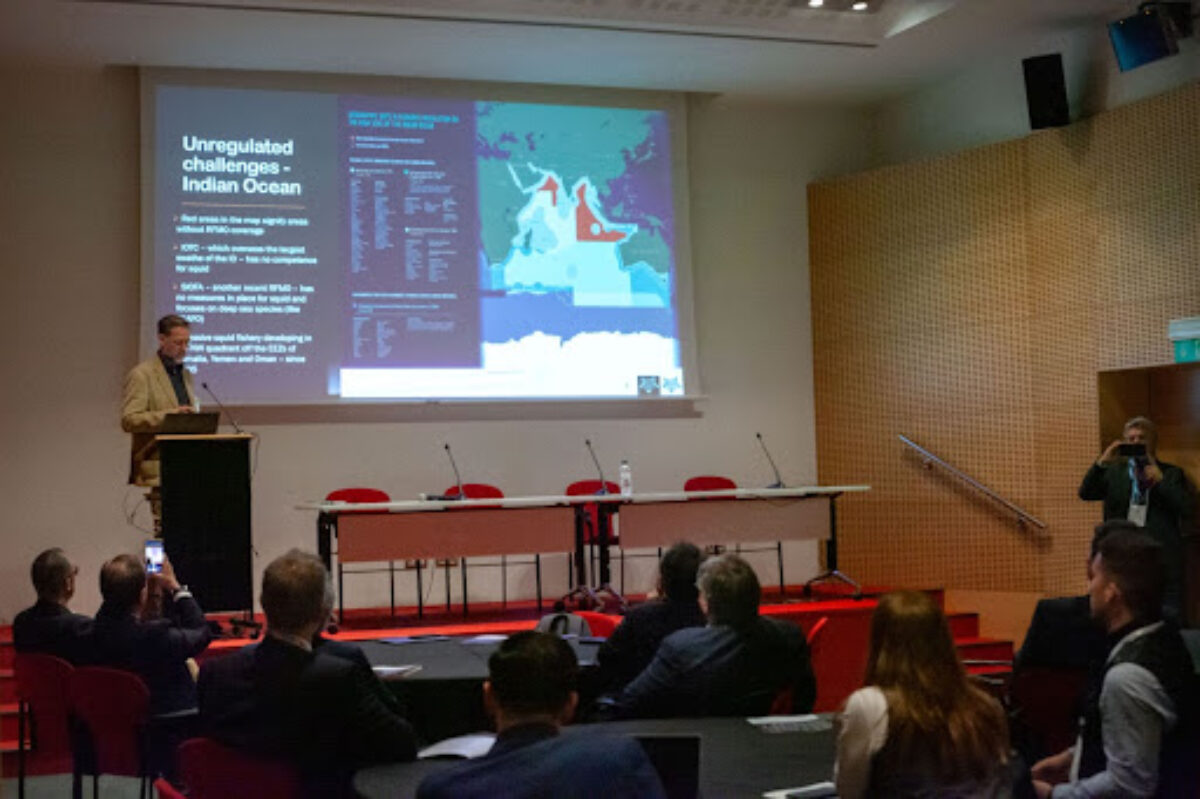Barcelona – At the Seafood Expo Global, members of the Global Squid Supply Chain Roundtable’s IUU Prevention Group, supported by Sustainable Fisheries Partnership (SFP), reviewed the status of squid fisheries around the world and analyzed the liabilities faced by importers and suppliers under EU IUU regulations.
Fisheries expert and researcher Gilles Hosch presented an overview of the main squid fisheries and analyzed the risks the industry faces from widespread illegal fishing, as well as the unregulated and unreported status of many squid fisheries. Currently, both the EU and US market systems are patchy and are relatively easy to fraud.
Gilles identified several actions the squid seafood industry can take to minimize risk of IUU fishing in the sector, including creating a pre-competitive space for collaboration, pursuing fishery improvement projects (FIPs) and certified fisheries, and working directly with retailers to secure responsible supply chains.
The presentation was followed by a panel session with Alfonso Miranda, president of CALAMASUR; David Comesaña, purchasing director at Congalsa; and Huw Thomas, director at 3 Pillars Seafood. The panelists discussed the issues and risks for different levels of the supply chain, including producers, processors, mid-supply chain companies, and retailers.
“It is much easier to convene Industry, producers, and processors than regulators to engage in sustainable initiatives, and they can react quicker,” said Miranda. “The recent CALAMASUR achievements are the result of a joint effort between industry and producers.”
The Committee for the Sustainable Management of the Jumbo Flying Squid (CALAMASUR) is a group of leading industry representatives of the artisanal, industrial, and processing sectors from Chile, Ecuador, Mexico and Peru, who are involved in jumbo flying squid work. Since launching in 2018, the group has presented two position statements to the members of the South Pacific Regional Fisheries Management Organisation (SPRFMO) requesting necessary improvements in science and management.
Comesaña commented on the public commitment announced at Seafood Expo North America in March 2022 by companies to address illegal, unregulated and unreported (IUU) fishing through new and strengthened purchasing policies, and the willingness to welcome new participants.
Thomas pointed out the need for supply chain companies to assume as soon as possible that they are probably sourcing IUU squid products.
“Experiences from other fisheries, such as tuna, show that precompetitive collaborations at different levels of the supply chain are a necessary first step in addressing IUU fishing in global fisheries,” said Carmen Gonzales-Valles, EU markets director at SFP. “SFP is working to engage companies in the Squid IUU Prevention Group to ensure that IUU fishing is eliminated from squid fisheries globally.”
The Squid IUU Prevention Group was formed in July 2021 by some members of SFP’s Global Squid Supply Chain Roundtable (SR), a group of squid buyers and importers who work together pre-competitively to drive improvement efforts in squid fisheries practices, management, and policy. As importers and distributors of processed squid products, the Working Group members are united in their desire to prohibit IUU-sourced squid products and stop labor and human rights abuses in their supply chains.

Gilles Hosch presenting an overview of the main squid fisheries and risks the industry is facing .
